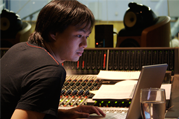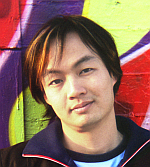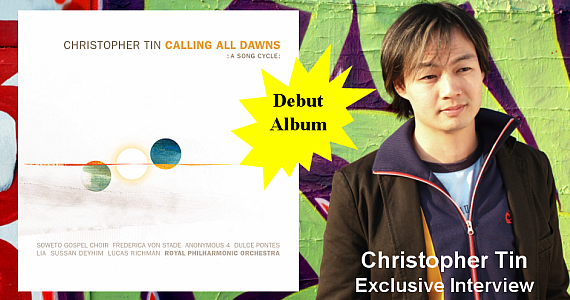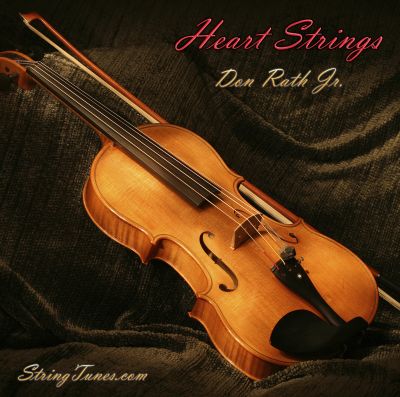Christopher Tin – Exclusive Interview
Christopher Tin – Exclusive Interview
Calling All Dawns
Don: First, let me say that I am truly and deeply honored that you have agreed to do this interview. It is with humility and great pride in your fantastic work that I am especially honored as you have done an absolutely amazing job on “Calling All Dawns“, your debut album!
Many people discover new artists long after they have spent years developing their craft. When did you first know in your mind and in your heart that music was to be a primary factor in your life?
Christo pher: This may sound strange, but… I’m not sure if I actually understand now that music is a primary factor in my life. Music was just something that I was good at all my life, and it’s just what I did. Of course growing up I kept all my options open, but even as I toyed with other career paths through college (law, architecture, screenwriting), I always just kept doing music. It was fun. I had a knack for it. It was only after I got accepted to the Royal College of Music that I knew in my mind that music was going to be something that was going to be the primary factor in my life. But the heart never seemed to catch on. Music has just been this thing that’s been so ingrained in me, in my day to day life that I just sort of sleepwalk through it. I take it for granted. I don’t ever sit back and say “Wow, I’m so glad that I’m doing music for a living.” I don’t really pause for self-reflection that way. I just sort of go through my life, and the music is there, and I do it every day. I totally just take it for granted–like eating, breathing, and sleeping. That sounds strange, I know.
pher: This may sound strange, but… I’m not sure if I actually understand now that music is a primary factor in my life. Music was just something that I was good at all my life, and it’s just what I did. Of course growing up I kept all my options open, but even as I toyed with other career paths through college (law, architecture, screenwriting), I always just kept doing music. It was fun. I had a knack for it. It was only after I got accepted to the Royal College of Music that I knew in my mind that music was going to be something that was going to be the primary factor in my life. But the heart never seemed to catch on. Music has just been this thing that’s been so ingrained in me, in my day to day life that I just sort of sleepwalk through it. I take it for granted. I don’t ever sit back and say “Wow, I’m so glad that I’m doing music for a living.” I don’t really pause for self-reflection that way. I just sort of go through my life, and the music is there, and I do it every day. I totally just take it for granted–like eating, breathing, and sleeping. That sounds strange, I know.
“Herein lays the true message: that all these facets of the cyclical nature of the world; living, giving birth to new life and dying are all universal to every person on this planet, no matter what their skin color or religious belief. In essence, we are all connected through our common human experiences. We all laugh. We all cry. We’re all born. We all die.” Christopher Tin
Don: Well, not really. Many artists/creators find that music is something so encompassing that it is like eating or breathing, including myself. Can you describe as best as you can where your inspiration comes from most often?
Christopher: I just turn ideas over and over in my head until something just comes up. I spend a lot of time just lost in my own world, processing things internally. Sometimes I’m oblivious to the outside world (and it drives my girlfriend crazy). Often inspiration comes when I’m walking my dog or taking a shower… at those times in life where the action I’m doing is just routine enough to let my mind wander, but I’m not under so much pressure that the subconscious isn’t allowed to throw me a curve ball.
Don: The old curve ball trick. Lest we forget, it really does keep one on their toes. Can you describe (in general) your creative process?
Christopher: I think I’m a very “reactive” composer. By that, I mean usually if I hear a few notes played, or read a few lines of text, my mind thinks of the complement to what I just heard. This is probably an acquired skill from my work in films and other visual media you simply have to respond quickly to the scene that’s placed in front of you. But, if I’m working on my own works, I’m more reliant on outside stimulus to get me moving on a piece. I use a lot of poems and sacred texts for example, to jog the creative process. Sometimes I’ll just noodle around on a piano, and maybe those three notes that I play ten minutes in will be the ones that kick off something in my head.
Don: As a result of all of this internally motivated and outside influenced inspiration, you have created some incredible music which has won or placed high in some important songwriting contests. Some of your awards are; two GANG Awards for your work in video games, a regional Emmy Award, the John Lennon Songwriting Competition, as a finalist and you have won the International Songwriting Competition in the world music category. How has this influenced you looking forward?
Christopher: Well, it doesn’t actually change much, really. Those sorts of awards are nice, but they’re not really why I’m in music. But, like I said before, if you asked me why I was in music and what I was doing, I wouldn’t really have all that good of an answer. It’s just what I do.
Don: Your debut album, Calling All Dawns was released just over a year ago on October, 1, 2009, which has been well received especially the track “Baba Yetu”. First, can you tell me about how the name Calling All Dawns came about?
Christopher: Calling All Dawns is actually a reference to a line from James Joyce’s Finnegan’s Wake that goes “Calling all downes! Calling all downes to dayne!” which is really just Joyce’s way of saying “Calling all dawns to day!” It happens at the beginning of the fourth book, at sunrise, and is a metaphor for resurrection. And since Calling All Dawns is all about the cycle of life, death, and rebirth, it was a fitting quote.
I was actually an English major through college, and I was heavily into modern literature. Finnegan’s Wake and Ulysses were both models for me in a way. I really admired how much structure he put into them (remember that at one point I was almost a career architect). Finnegan’s Wake in particular is a mono-mythic narrative about life, death, and rebirth, and has the peculiar literary device of starting in the middle of a sentence, and then ending in the first half of that same sentence. If you listen to Calling All Dawns, it starts and ends in the same way… in the middle of the same chord.
Don: Based upon the sonic experience one gets from listening to Calling All Dawns we are all beneficiary of the decision you’ve made to pursue music. What has this past year been like for you?
Christopher: It’s been hard, emotionally. I spent four years working on Calling All Dawns, and to finally finish it was one of the most psychologically traumatizing things I’ve ever gone through. When you put that much effort into something and it dominates you for so long, to finally letting go of it is incredibly hard. I had to deal with a lot of postpartum issues afterward. I kept calling up my engineer (Grammy-winner John Kurlander) and asking him “Does it sound okay?” Fortunately he’s been through this with a ton of other artists, and was able to help me keep it all in perspective. But, for six months after its release, I couldn’t listen to the album. I wanted nothing to do with it.
“Often inspiration comes when I’m walking my dog or taking a shower… at those times in life where the action I’m doing is just routine enough to let my mind wander, but I’m not under so much pressure that the subconscious isn’t allowed to throw me a curve ball.” Christopher Tin
Don: Calling All Dawns offers a message which is really quite profound, “the cycle of life“. Can you tell us from your perspective, as the composer and arranger, what that message is and how you went about using music to express those ideas?
Christopher: Well, I think of the “cycle of life” less as a message and more as an observation. If you think about it, the fact that the world works in cycles is probably one of the very first things that our primitive ancestors noticed. They saw the sun rise and set every day. They saw seasons come and go. They saw crops wither, and then grow. They saw death, but also birth.
Don: Certainly the message comes across quite well with the arrangements and the sequence of the music on Calling All Dawns. This album includes twelve compositions, one in each of twelve different languages. What can you tell us about that?
Christopher: Herein lays the true message: that all these facets of the cyclical nature of the world; living, giving birth to new life and dying are all universal to every person on this planet, no matter what their skin color or religious belief. In essence, we are all connected through our common human experiences. We all laugh. We all cry. We’re all born. We all die.
Don: I’m hearing that the concept of “cycles of life” comes up repeatedly. Calling All Dawns is considered by many to be a cycle song or cycle album. Can you explain what that means?
Christopher: Since I already had my big picture concept the cycle of life,  death, and rebirth as well as my message (unity across cultures), I needed a composition format format to couch all this in and what better (musical) form than the song cycle? It’s a collection of songs, all thematically bound together; but true to its implied meaning, Calling All Dawns is a collection of music that is truly cyclical, beginning and ending in the same way. What’s more, to emphasize the idea that we’re all unified, all of the songs have thematic connections to other songs; so for example, the melody of one song might come back as the instrumental bridge of the other, etc.
death, and rebirth as well as my message (unity across cultures), I needed a composition format format to couch all this in and what better (musical) form than the song cycle? It’s a collection of songs, all thematically bound together; but true to its implied meaning, Calling All Dawns is a collection of music that is truly cyclical, beginning and ending in the same way. What’s more, to emphasize the idea that we’re all unified, all of the songs have thematic connections to other songs; so for example, the melody of one song might come back as the instrumental bridge of the other, etc.
Don: So rather than being simply a collection of individual songs, each is fulfilling a vital and important role, both thematically as well as melodically, within the entire album
Christopher: Yes, exactly.
Don: You use a blend of instruments and styles throughout this CD, music styles that would fit into different genres such as classical, Jazz and World Music. Do you consider this work a “crossover album” and secondly, what in your opinion is crossover music?
 Christopher: I do consider this to be a crossover album, yes. And I have to say that it’s my preferred type of crossover project as well. The Billboard Classical Crossover charts are a strange assortment of albums, covering everything from light classical, “popera”, rock stars re-recording their albums with orchestras, classical musicians recording non-classical works, classical stars doing massive collections of duets, film scores, and the occasional new fusion work that blends together musicians from different genres. This latter type of album is my favorite, and the kind that I wanted to create something where a composition was conceived from the ground up as a blend of different styles of music. A lot of classical crossover projects are musicians performing songs of a different genre… I prefer those projects that are new works created with the blend of genres in mind.
Christopher: I do consider this to be a crossover album, yes. And I have to say that it’s my preferred type of crossover project as well. The Billboard Classical Crossover charts are a strange assortment of albums, covering everything from light classical, “popera”, rock stars re-recording their albums with orchestras, classical musicians recording non-classical works, classical stars doing massive collections of duets, film scores, and the occasional new fusion work that blends together musicians from different genres. This latter type of album is my favorite, and the kind that I wanted to create something where a composition was conceived from the ground up as a blend of different styles of music. A lot of classical crossover projects are musicians performing songs of a different genre… I prefer those projects that are new works created with the blend of genres in mind.
Don: In essence creating a new genre?
Christopher: Yes!
Don: You had mentioned that the project Calling All Dawns was a four year process to complete the cycle from concept to production. This definitely shows your persistence and dedication to making this CD a major work of art and craft. Please explain the most difficult thing to overcome when making this CD and what was the most enjoyable thing for you while making it?
Christopher: I spent a lot of time finessing every little detail of the album, down to adjusting faders by a tenth of a decibel. It was well beyond obsessive. The hardest part of the whole process was just to maintain an interest in the music I was working on, and not to just get tired of it. That was incredibly hard. As far as the highlights of the process, I think that anytime I was in the studio with the musicians was a highlight–especially the orchestral sessions at Abbey Road. That was just an absolute thrill!
When Speaking about Calling All Dawns, Christopher had this comment to make;
“I wanted to create something where a composition was conceived from the ground up as a blend of different styles of music.”
Don: Abbey Road Studios, where the Beatles and many great artists have recorded. It sounds like this quite the experience. Please explain the story behind how you came to record the CD Calling All Dawns at Abbey Roads Studios and what was this experience like?
Christopher: It was only one day when I was at Abbey Road, but it was a great one. It came about when I asked an old friend of mine, the contractor James Fitzpatrick, what sort of orchestras I might have access to for recording purposes. He replied that he could get me the Royal Philharmonic for my project, and offered me my choice of scoring stages in London. Abbey Road had the right acoustics that I was looking for… AND it was, well, Abbey Road Studios! So he booked it for me.
Don: Goes to show you the value of relationships. What was it like for you to be able to hear your own musical creations being performed by world class Royal Philharmonic Orchestra as well as the many incredible performers involved, such as; Soweto Gospel Choir, Frederica von Stade, Dulce Pontes, Anonymous 4, Sussan Deyhem and J-Pop star Lia? (See links below)
Christopher: Thrilling! But the problem about doing something like this is that there’s rarely a moment where you can sit back and “live in the moment”. Any time I was in the studio, I was mindful of the clock, and working hard to try to get a good take out of the musicians. I didn’t have a lot of time to sit back and revel in the moment, unfortunately.
Don: Now, you have submitted Calling All Dawns to be considered for a 2010 Grammy Award. Please describe what it would mean to you to win, especially with your debut album.
Christopher: To be nominated for a Grammy, or to even win one, would be amazing… especially since this was my first album. I honestly don’t know how I would react, though… whether it would drive me to do another fusion project like Calling All Dawns, or whether it would spur me to pursue some of my other musical interests. I just don’t know. As you may have guessed by now, I tend to be better at doing the work, and not as good at enjoying the moment.
Don: Well, let us all hope that it spurs you on to do another musical project such as Calling All Dawns. Is there anything else you would like to add?
Christopher: Just that I’ve been grateful for the response to the album, especially from my fellow musicians. I would also like to take this opportunity to once again thank the many contributors who have made this a successful project and thanks to you Don, for providing yet another source for getting the word out there!
Don: Thank you Christopher for making this interview possible. Again, we are honored by your willingness to do so. Thank you!
About Christopher Tin
Please visit the following links to learn more about Christopher Tin.
Notes
Christopher Tin’s “Baba Yetu”, from the album “Calling All Dawns” – used as a featured segment in the Dubai Fountain, the world’s largest water feature. To learn more visit Tin’s Official Website.
“Baba Yetu” can be heard on Christopher Tin’s debut album “Calling All Dawns“, a 12-song concept album featuring performances by the Soweto Gospel Choir, Sussan Deyhim, Anonymous4, Dulce Pontes, Frederica von Stade, Lia, and the Royal Philharmonic Orchestra.
“Baba Yetu” is also well known as the theme song to the video game Civilization IV, and has received hundreds of live performances around the world from professional orchestras like the Hollywood Bowl Orchestra, National Symphony Orchestra and Philharmonia, as well as local school and church choirs.
The Dubai Fountain is created by WET Design, the creators of the Bellagio Fountain in Las Vegas. It’s situated at the base of the Burj Dubai, the tallest skyscraper in the world.
Video footage courtesy of Stefan Grudl at his Official YouTube website (www.youtube.com/19Gizmo76). Baba Yetu Video Footage





